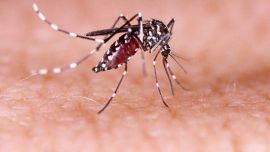Authorities in Argentina are calling on the population to remove stagnant accumulations of water from their homes and surroundings as the country suffers from its worst dengue outbreak since 2020.
Buenos Aires City registered its first deaths from the mosquito-borne virus last week when two individuals, aged 73 and 74, lost their lives after being infected by the disease.
A few days later, a 21-year-old woman without pre-existing health concerns from Rafaela, a city in the Santa Fe province, also died from the virus, which spreads from the bite of the aedes aegypti mosquito.
This summer’s dengue outbreak is the largest in Argentina since 2020. A report from the National Health Ministry, released Tuesday, said that over 41,200 cases and 39 deaths have been recorded so far this year, with 37,914 are estimated to have been infected within Argentina, suggesting high circulation rates within the 15 provinces affected by the virus.
“We are facing a major outbreak. It is the fourth major epidemic outbreak in the history of the country,” Dr. Tomás Ordun, an infectious disease specialist and former head of Tropical Medicine at Muñiz hospital in Buenos Aires, told Perfil in an interview.
The National Institute of Viral Diseases’ genetic sequencing studies, released by the Health Ministry on Tuesday, indicated that there are two variants in circulation — Dengue Serotype 1, which has traditionally circulated in Argentina and Dengue Serotype 2, which is typically less common, and perhaps accountable for increased infection rates.
The virus is currently present in four regions: Central Region (Buenos Aires; Autonomous City of Buenos Aires; Córdoba; Entre Ríos; Santa Fe); Northeastern region (Corrientes; Formosa; Chaco), Northwestern region (Catamarca; Jujuy; La Rioja; Salta; Santiago del Estero; Tucumán) and the province of San Luis in the Cuyo region.
For nervous citizens in provinces with high infection rates like Córdoba and Santa Fe, the fear surrounding the spread of dengue feels similar to the paranoia that spread with Covid-19.
“As we learned with the Covid pandemic, once one begins to hear acquaintances, relatives and close friends discuss infection, that means the epidemic, the situation, the problem has taken hold of the community,” Orduna explained.
Vaccines, treatments, prevention
Authorities revealed this week that a new dengue vaccine, known as QDENGA or TAK-003, is currently being tested by the National Administration of Medicine, Food and Medical Technology (ANMAT) after positive results elsewhere in the region.
The vaccine, developed by a Japanese firm called Takeda Laboratory, is currently approved in Europe and has performed well during testing in Brazil.
QDENGA, which requires two doses over a three-month period for maximum efficiency, is expected to gain approval from ANMAT by the end of this year or in early 2024.
As of now there are no other approved vaccines or specified treatment plans in Argentina for dengue. Treatment plans, which often include drinking water to replenish liquids and daily health monitoring, are symptomatic.
The Health Ministry recommends that those experiencing symptoms — such as fever, headaches, muscle and joint pain, nausea and vomiting, exhaustion, spots on skin and itching or bleeding in nose and gums — speak with a doctor immediately.
Experts forecast that the coming drop in temperature, expected to arrive in the next two months, will lead to a decline in cases: “We are going to have an even higher rate of incidents in the coming weeks until the expected decline begins with the beginning of the deep autumn season. The temperature drop will help us reduce the activity of the mosquitos,” explained Dr Orduna.
To ensure the infection does not return next summer, experts recommend targeting potential mosquito breeding sites, instead of simply fumigating adult mosquitoes.
“The most important preventative measure is the elimination of all mosquito breeding sites, that is, of all containers that contain water both inside houses and in surrounding areas,” said a spokesperson for the National Health Ministry.
– TIMES/PERFIL























Comments